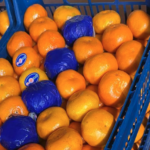Low rainfall lifts South African stonefruit quality, says Capespan

As Capespan South Africa faces its busiest week of the stonefruit season, many key markets are less active than expected despite improved fruit quality. 
A representative from the stonefruit team told www.freshfruitportal.com a major supermarket in one of the company's biggest markets was already pushing to generate much-needed sales for some varieties.
"I'm getting the impression that the markets are fairly flat across the board. In the U.K. they are telling us they're pretty saturated at this point in time - you've got Tesco which is doing price promotions already," the representative said.
"It's more nectarines, but they're going for nectarines and peach promotions at really discounted prices."
Capespan stonefruit is focused on early season cultivars, with the majority of fruit arriving around weeks 47 to 49. This fruit generally has a shorter shelf life than the later crop but tends to fetch better prices as yields are lower.
The discounted fruit on sale now was likely packed for seafreight back in week 44, arousing fears about the fate of fruit being packed now.
"At this point even the European clients are saying although we're in week 48, there are no takers on fruit. It's very quiet. So it's a bit concerning at this stage," the representative said.
To make matters more frustrating it is unclear why the pace of sales is relatively slow, since there is 'no competitive offer' at the moment, bar the European winter crop that is under pressure from the Russian ban. Chile is not expected to enter the market with large volumes until halfway through the South African season.
"There's no reason for it. The prices that they're quoting now are actually on par with last year, and they're saying it's slow," the team member said.
"So I don't know what is going on in Europe - I don't know if it's to do with the citrus season, or off the back of a bad Northern Hemisphere stonefruit season, or what it is."
Some market problems have also been reported from the Middle East.
The Capespan representative did emphasize, however, that markets varied greatly between peaches, nectarines, apricots and plums, with different clients seeing diverse sales rates.
Varied fruit quality due to microclimates
The quality of Capespan's stonefruit from its few dozen growers has been 'very varied', but is positive overall this year compared to previous seasons due to the lack of recent heavy rainfall or hail. These differentials are a result of numerous microclimates in the company's main growing region, the Western Cape.
The drier weather has also led to fewer instances of decay, which was reportedly not the case in the last three seasons.
"Someone on one side of the mountain might have rain but someone on the other side might not. You've got different microclimates, you've got valleys, and fruit is obviously produced in lots of different areas," the representative said, emphasizing they could only give a general viewpoint of Capespan's fruit quality, and was not speaking for the entire industry.
"Historically in weeks 42, 43, 44 we normally have a lot of rain and hail in the Western Cape and this year we had almost none of those.
"It's the first time in three years that we haven't had lots of rain. We did have a little bit of hail, which impacted on the plums more than peaches or nectarines."
Although most of the peaches and nectarines had 'optimum picking conditions', some of the fruit was arriving in export markets with lower Brix values than hoped for. However, the fruit was said to have an excellent acid to sugar ratio, making for a good eating experience.
The representative added although the industry had forecast roughly a 10% boost in plum exports for the season, much of the fruit appeared to either be of a smaller sizing or damaged by hail, and so might not meet the packing requirements for export.
Early exports across the board
The South African stonefruit season has generally been running earlier than last campaign, with significantly higher volumes sent to three key markets between weeks 40-47.
According to statistics published by Hortgro, exports to the EU, U.K. and the Middle East are much higher.
Hortgro reported 5,909 cartons of apricots were sent to the EU over that time period last year, while 72,917 have been sent this year, representing a 1134% difference; 266% more nectarines have also been sent to the Middle East year-on-year.
Photo: www.shutterstock.com











































